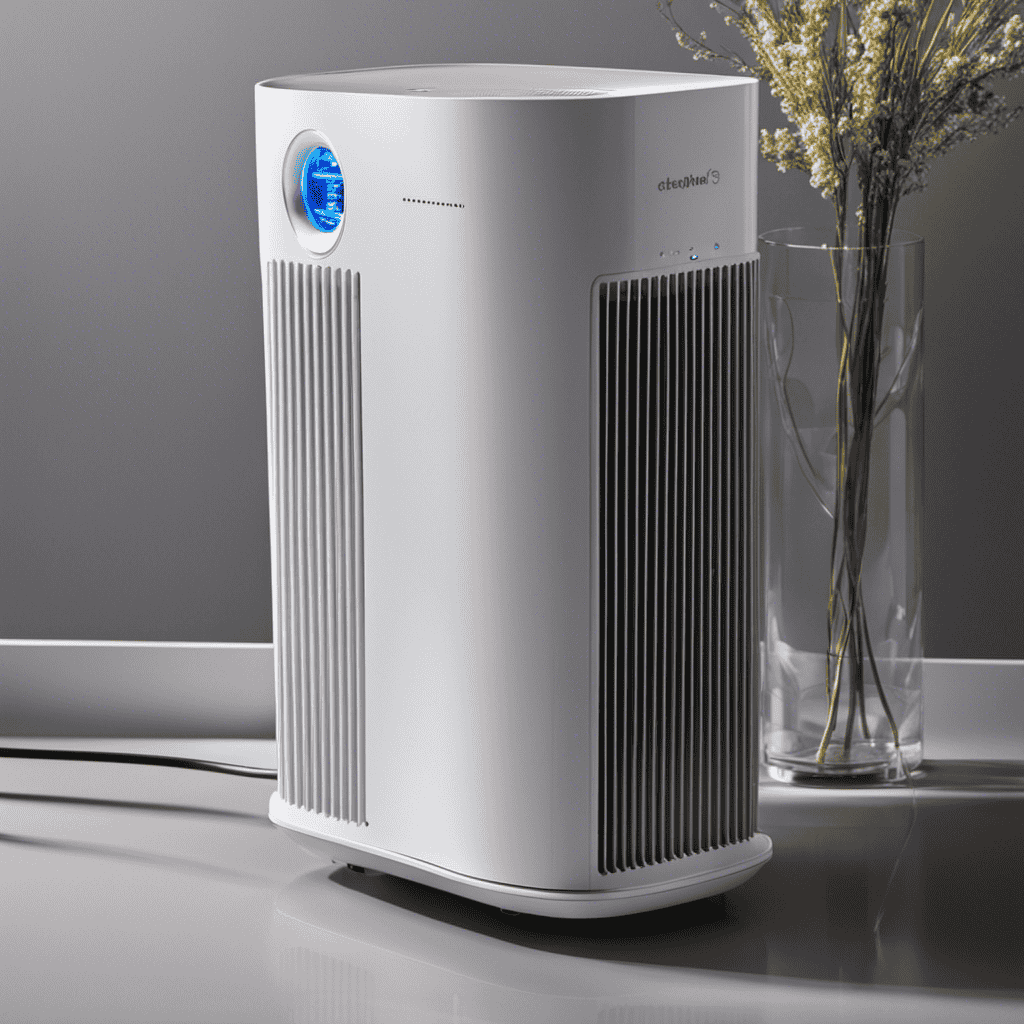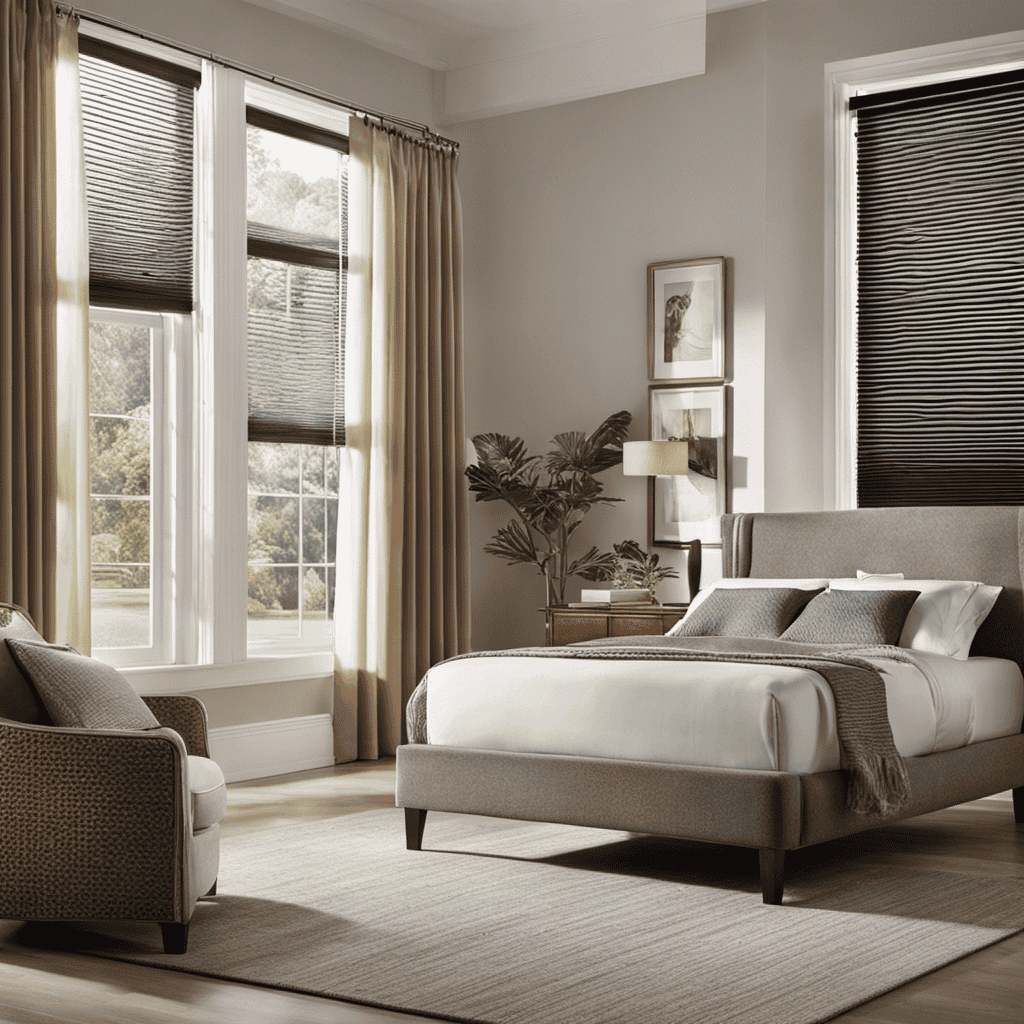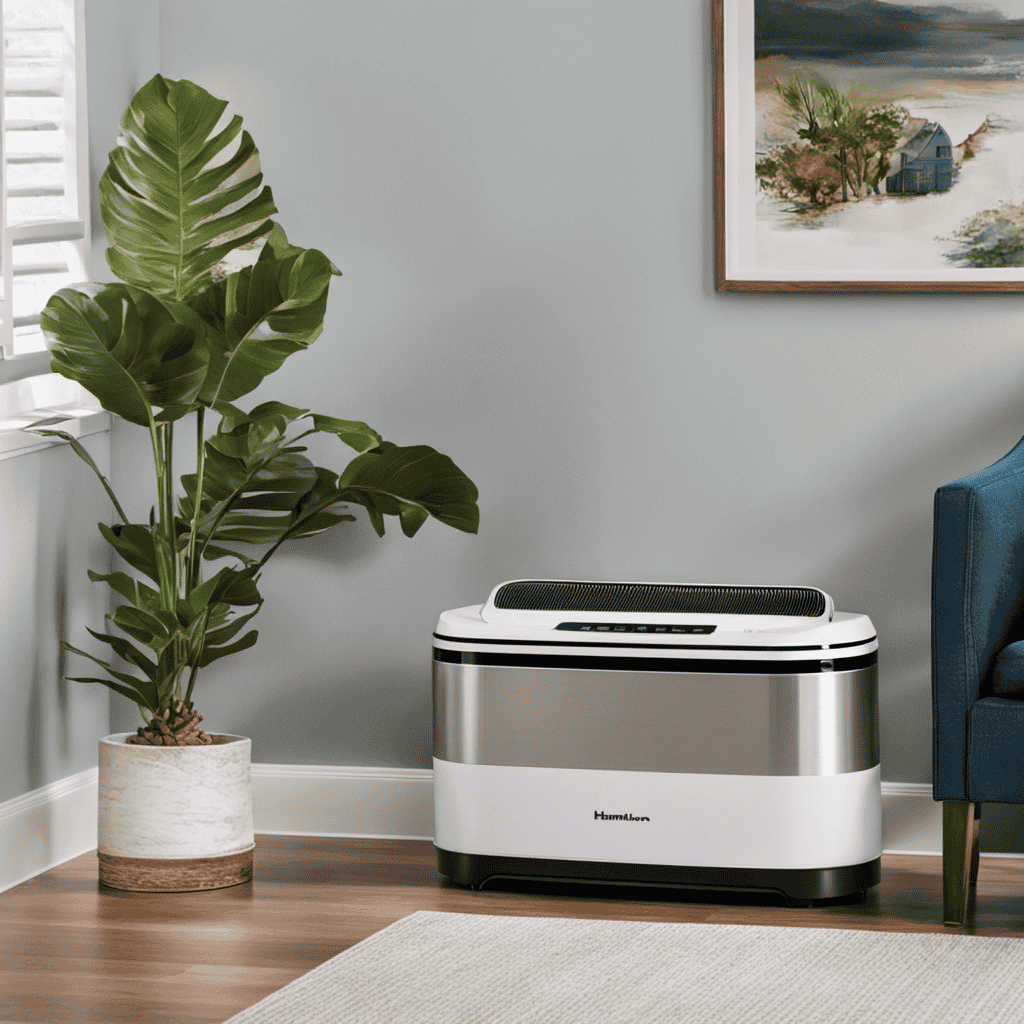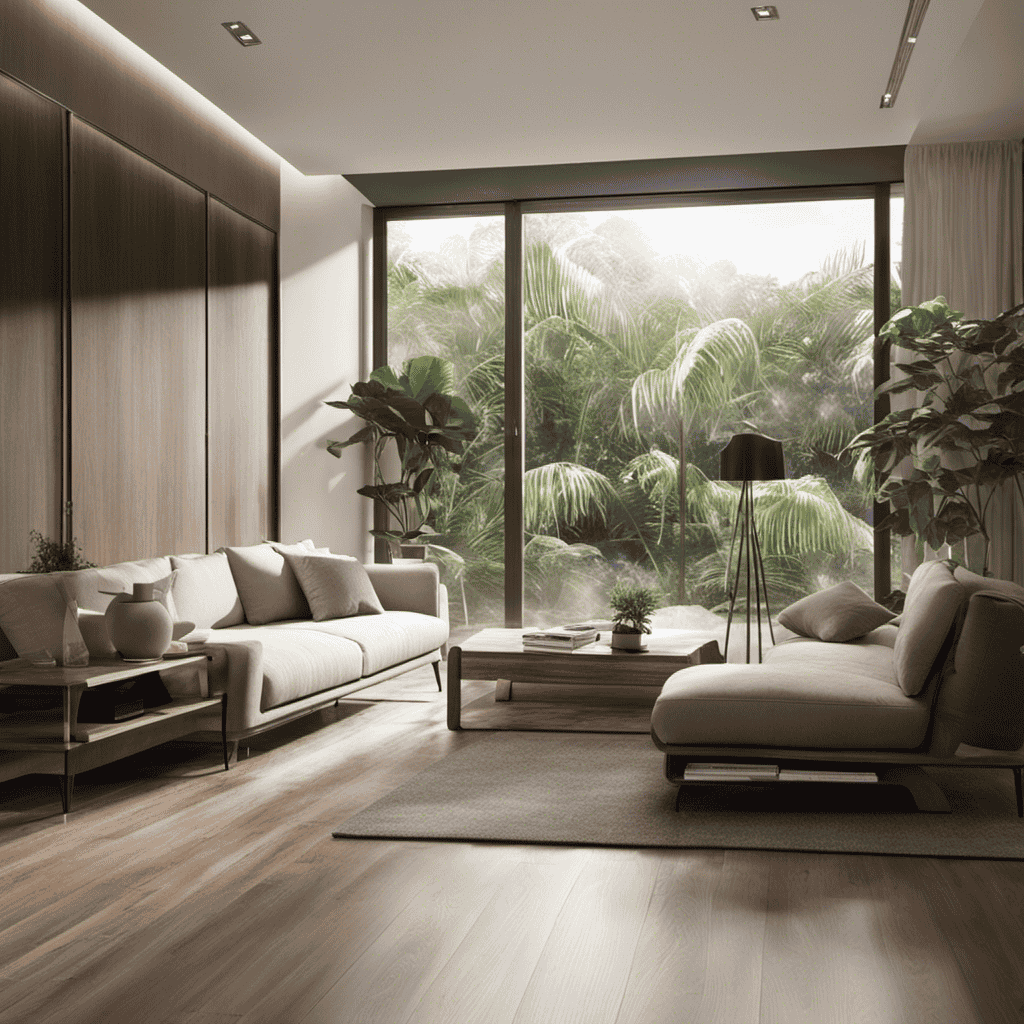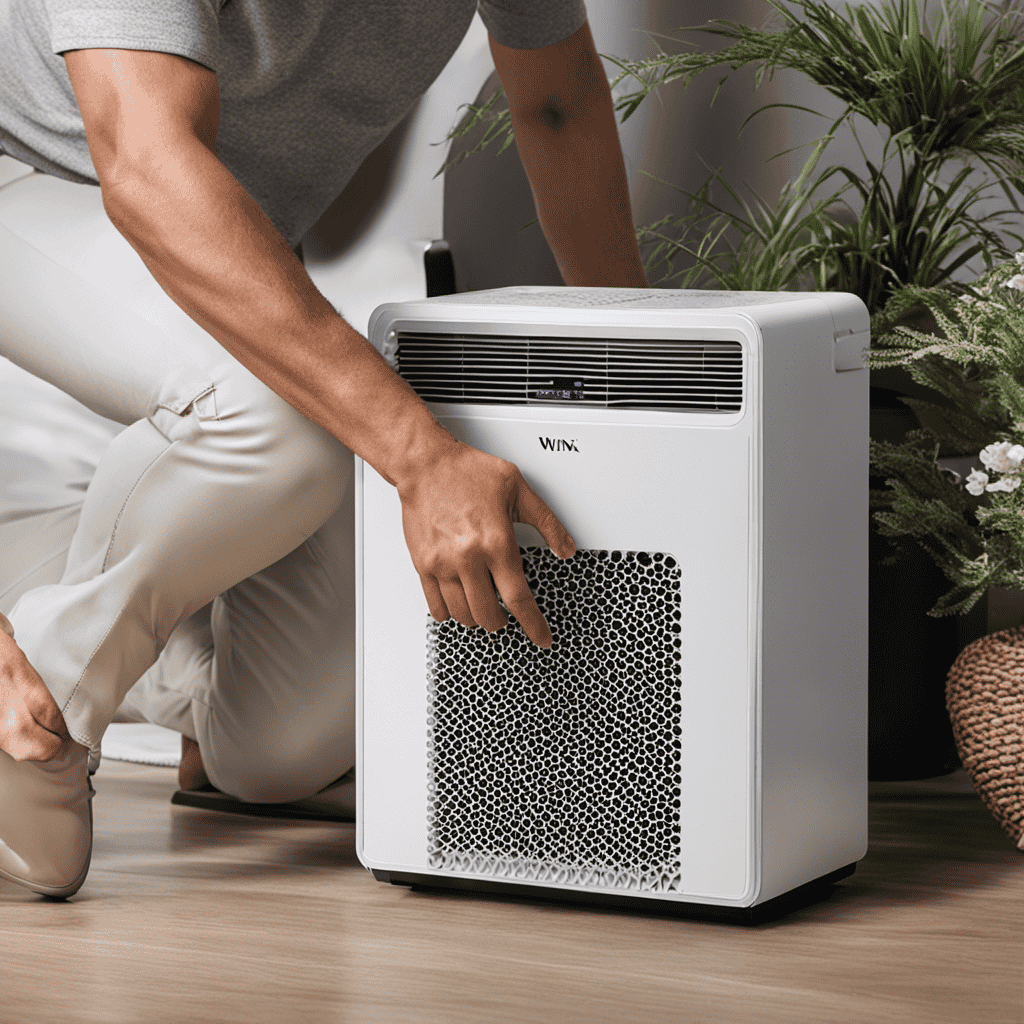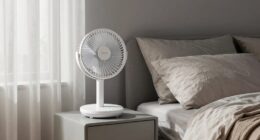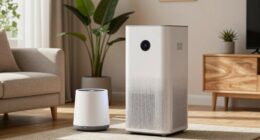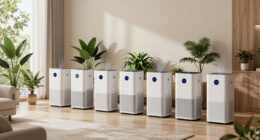You’ve purchased an air purifier with an ionizer in hopes of breathing in cleaner and fresher air. But have you ever thought about how long these ionizers actually endure? Let me fill you in.
In this article, we’ll explore the factors that affect the lifespan of air purifier ionizers, share some maintenance tips to keep them running efficiently, and discuss the importance of regular cleaning.
So, let’s dive in and find out just how long these ionizers can work their magic!
Key Takeaways
- Regular cleaning and maintenance of components is crucial for the optimal performance and longevity of air purifier ionizers.
- Air quality plays a significant role in the lifespan of ionizers, with highly polluted environments leading to faster wear and tear.
- Proper placement of ionizers, such as keeping them at least a foot away from walls and positioning them at chest level or higher, is important for effective dispersion of ions and optimal coverage.
- Regular cleaning helps improve air quality, reduces respiratory symptoms, and removes accumulated particles and allergens for a healthier living environment.
Factors Affecting the Lifespan of Air Purifier Ionizers
When it comes to the lifespan of air purifier ionizers, there are several factors that can affect how long they will work effectively.
One of the key factors is the maintenance techniques employed. Regular cleaning of the ionizer’s components, such as the filters and plates, is essential to ensure optimal performance and longevity. Dust and debris can build up over time, clogging the filters and reducing the ionizer’s effectiveness.
Another important factor is the impact of air quality on the ionizer’s lifespan. If the air in the environment is highly polluted, the ionizer may have to work harder to purify the air, leading to faster wear and tear.
Therefore, it is crucial to ensure good air quality and minimize exposure to pollutants to prolong the lifespan of air purifier ionizers.
Maintenance Tips to Extend the Efficiency of Ionizers
In order to ensure the optimal performance of ionizers, it is important to maintain a regular cleaning schedule. Cleaning frequency for ionizers can vary depending on factors such as usage and environmental conditions, but a general guideline is to clean them every two to four weeks.
Additionally, proper placement of ionizers is crucial for their effectiveness. They should be positioned in an area with good air circulation and away from obstructions.
Cleaning Frequency for Ionizers
The cleaning frequency for ionizers depends on how often you use them and the air quality in your environment. Regular cleaning is essential to maintain the efficiency and effectiveness of your ionizer. Cleaning techniques may vary depending on the specific model, but generally, it involves removing the collection plates or filters and cleaning them with mild soap and water. It is recommended to clean the plates or filters at least once every two weeks or as needed. Regular cleaning not only ensures that your ionizer is working at its best, but it also helps to remove the accumulated particles and allergens from the air. This can lead to improved air quality, reduced respiratory symptoms, and a healthier living environment.
| Cleaning Technique | Benefits of Using Ionizers |
|---|---|
| Regular cleaning with mild soap and water | Improved air quality |
| Removal of accumulated particles and allergens | Reduced respiratory symptoms |
| Maintenance of efficiency and effectiveness | Healthier living environment |
Proper Placement for Effectiveness
To maximize effectiveness, make sure you place your ionizer in an area with good air circulation. Proper positioning of an ionizer can have a significant impact on air quality. Here are some important factors to consider:
- Distance from walls: Keep the ionizer at least a foot away from walls to ensure proper airflow and distribution of ions.
- Height placement: Mount the ionizer at chest level or higher to allow the ions to disperse throughout the room effectively.
- Central location: Position the ionizer in the center of the room to optimize its coverage and reach all corners.
Common Signs of Ionizer Malfunction
When it comes to maintaining the efficiency of ionizers, there are a few key tips to keep in mind.
First, regular cleaning is crucial to prevent buildup and ensure optimal performance.
Second, checking and replacing the ionizer plates as needed will help to maintain their effectiveness.
Lastly, troubleshooting common issues such as strange odors or weak ionization can help identify and resolve any problems that may arise.
Ionizer Maintenance Tips
Make sure you regularly clean the ionizer plates in your air purifier to maintain its effectiveness. Cleaning the ionizer plates is essential for optimum performance and longevity. Here are some ionizer cleaning techniques that can help you keep your air purifier in top condition:
- Gently remove the ionizer plates from the unit according to the manufacturer’s instructions.
- Use a soft brush or cloth to wipe away dust and debris from the plates.
- If there is stubborn dirt or residue, you can soak the plates in a mixture of warm water and mild detergent for a few minutes before rinsing them thoroughly.
Regularly cleaning the ionizer plates offers several benefits:
- Improved air quality: By removing pollutants and particles from the air, clean ionizer plates ensure that your air purifier can effectively purify the air in your home.
- Extended lifespan: Cleaning the plates prevents buildup that can lead to decreased efficiency and performance, ultimately extending the lifespan of your air purifier.
- Cost savings: Maintaining your air purifier’s effectiveness through regular cleaning can save you money in the long run by preventing the need for costly repairs or replacement.
Troubleshooting Ionizer Issues
Cleaning the ionizer plates regularly can help troubleshoot common issues and ensure the proper functioning of your air purifier. One common issue is a build-up of dirt and debris on the ionizer plates, which can hinder their performance. By regularly cleaning these plates, you can improve the efficiency of the ionizer and maintain clean air in your home.
Another common problem is a malfunctioning power supply. If your ionizer is not turning on or is not producing ions, check the power supply and make sure it is properly connected.
Additionally, if you notice a burning smell or strange noises coming from your ionizer, it may indicate a faulty motor or fan that needs to be replaced. By addressing these common issues, you can ensure that your ionizer is working effectively and providing you with clean, fresh air.
Now that we’ve discussed troubleshooting ionizer issues, let’s explore the importance of regularly cleaning ionizers to prevent these problems from occurring in the first place.
The Importance of Regularly Cleaning Ionizers
To ensure optimal performance, it’s crucial that you regularly clean your ionizers. Regular maintenance plays a key role in keeping your ionizers functioning at their best.
Here are the benefits of cleaning ionizers frequently:
-
Improved Air Quality: Cleaning your ionizers removes accumulated dust, allergens, and other pollutants, ensuring that the air you breathe is clean and healthy.
-
Enhanced Efficiency: Over time, ionizers can become clogged with dirt and debris, leading to decreased efficiency. Regular cleaning helps to maintain the ionizers’ effectiveness in purifying the air.
-
Prolonged Lifespan: By cleaning your ionizers regularly, you prevent the buildup of dirt and grime that can cause damage to the components. This helps to extend the lifespan of your ionizers.
Regular maintenance and cleaning are essential for optimal performance and longevity of your ionizers.
Now let’s explore how often you should replace ionizer components.
How Often Should You Replace Ionizer Components
When it comes to replacing ionizer components, you’ll want to consider the specific manufacturer’s recommendations for optimal performance. However, there are some general guidelines that can help you determine when it’s time to replace these components. Proper care for ionizer components is essential to prolong their lifespan and ensure their effectiveness.
One way to determine when to replace ionizer components is by monitoring their performance. If you notice a decrease in the air purifying capability of your ionizer or if it fails to remove odors and pollutants as effectively as before, it may be time for a replacement.
Another factor to consider is the lifespan of the ionizer components. Most manufacturers provide an estimated lifespan for their components, which can range from several months to a couple of years. It’s important to follow these recommendations and replace the components accordingly.
Table:
| Signs that it’s time to replace ionizer components | Proper care for ionizer components |
|---|---|
| Decreased air purifying capability | Regular cleaning of components |
| Ineffective odor and pollutant removal | Avoiding exposure to excessive moisture |
| Exceeding the manufacturer’s recommended lifespan | Keeping the ionizer away from direct sunlight |
| Visible damage or wear on the components | Storing the components in a clean and dry place |
| Strange noises or malfunctioning of the ionizer | Avoiding the use of harsh cleaning agents |
Potential Risks of Using Expired Ionizers
Expired ionizers can pose potential risks to your health and the air quality in your home or office. Using an ionizer past its expiration date can lead to a decrease in its effectiveness and the accumulation of harmful particles in the air.
Here are some of the risks and health concerns associated with expired ionizers:
-
Reduced air purification: Expired ionizers may not be able to effectively remove pollutants and allergens from the air, leading to poor indoor air quality.
-
Increased respiratory issues: These ineffective ionizers can allow allergens, dust, and other irritants to remain in the air, potentially triggering allergies, asthma, and other respiratory conditions.
-
Accumulation of ozone: Some ionizers produce ozone as a byproduct, which can be harmful when inhaled in high concentrations. Expired ionizers may release more ozone into the air, increasing the risk of respiratory issues.
It is important to be aware of these risks and replace expired ionizers promptly to ensure clean and healthy indoor air.
Now, let’s explore the lifespan of different ionizer models and how they compare.
Comparing the Lifespan of Different Ionizer Models
Comparing different ionizer models can help you determine which one will last the longest and provide the most effective air purification. Factors such as the quality of materials used, the technology employed, and the maintenance requirements can significantly impact the lifespan of an ionizer.
Here is a comparison table of three popular ionizer models:
| Model | Lifespan | Technology | Maintenance |
|---|---|---|---|
| Model A | 3 years | Electrostatic | Regular cleaning of plates |
| Model B | 5 years | UV-C Light | Replacement of UV-C bulb every 2 years |
| Model C | 10 years | Bipolar Ionization | Minimal maintenance required |
Using an ionizer has several benefits, including the removal of airborne pollutants, such as dust, allergens, and bacteria. Ionizers also help neutralize odors, leaving your indoor air fresh and clean. Moreover, they can improve respiratory health and reduce the risk of respiratory illnesses. By comparing the lifespan and features of different ionizer models, you can select the one that suits your needs and ensures long-lasting and efficient air purification.
Frequently Asked Questions
Can Air Purifier Ionizers Remove All Types of Indoor Air Pollutants?
Yes, air purifier ionizers can effectively remove various types of indoor air pollutants. They target indoor air pollution sources such as dust, pollen, pet dander, and smoke, helping to improve indoor air quality.
Can Air Purifier Ionizers Help With Allergies and Asthma?
Air purifier ionizers can be helpful for allergies and asthma by reducing indoor air pollutants. They work by releasing negatively charged ions that attach to allergens and irritants, making them heavy and fall to the ground.
How Much Noise Do Air Purifier Ionizers Make While Operating?
Air purifier ionizers are effective at removing particles from the air, but they can produce harmful byproducts like ozone. As for noise, it varies depending on the model, but some can be quite loud.
Are Air Purifier Ionizers Safe to Use Around Children and Pets?
As a user, I want to know if air purifier ionizers are safe around children and pets. Air purifier ionizers can be effective in improving air quality, but there are potential health risks associated with their use.
Can Air Purifier Ionizers Eliminate Odors From Cooking and Smoking?
Yes, air purifier ionizers can effectively eliminate odors from cooking and smoking. They work by releasing negatively charged ions that bind with odor-causing particles, neutralizing them and improving indoor air quality.
Conclusion
In conclusion, air purifier ionizers are like the unsung heroes of clean air. They work tirelessly, fighting off pollutants and improving the quality of our surroundings. However, just like any hero, they too have their limitations.
Understanding the factors that affect their lifespan and following maintenance tips are crucial to ensure their efficiency. Regular cleaning and timely replacement of components are essential for optimal performance. Ignoring these steps could lead to potential risks and a decline in air purification.
So, let’s give our ionizers the care they deserve and breathe in the freshness they provide.
